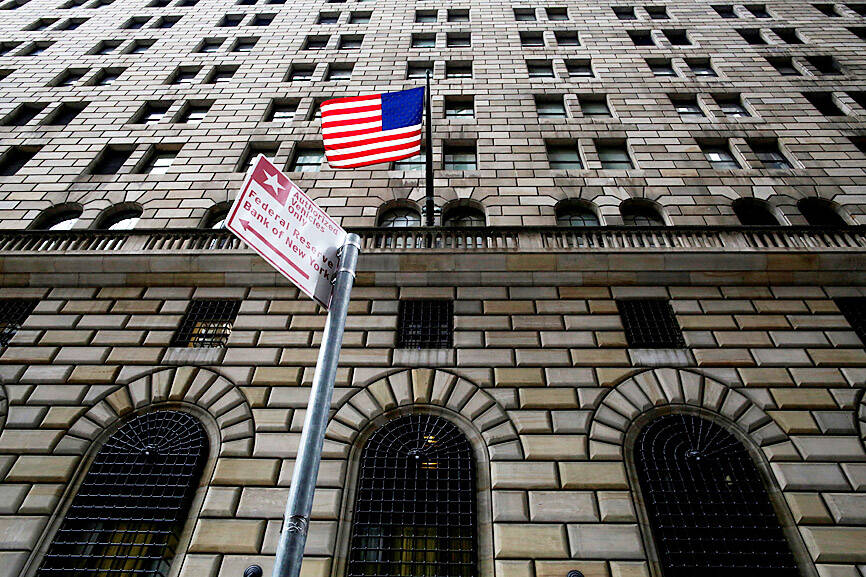US Federal Reserve officials said earlier this month that the US central bank should soon moderate the pace of interest rate increases to mitigate risks of overtightening, signaling they were leaning toward downshifting to a 50 basis-point hike next month.
“A substantial majority of participants judged that a slowing in the pace of increase would likely soon be appropriate,” minutes from the Federal Open Market Committee’s (FOMC) Nov. 1 to 2 gathering released on Wednesday said.
While US Federal Reserve Chair Jerome Powell said that rates would probably ultimately go higher than officials’ September forecasts, Wednesday’s report gave a more nuanced take.

Photo: REUTERS
“Various” officials — a descriptor not commonly used in the minutes — concluded that rates would ultimately peak at a higher level than previously expected.
In another revelation, Fed staff told officials during the gathering that their assessment of the risks of a recession had grown to almost 50-50.
That was the first such warning since the central bank began raising rates in March.
US stocks and Treasuries rallied while the US dollar fell following the report, as investors took a dovish message from the minutes.
At the meeting, officials raised the benchmark rate 75 basis points for a fourth straight time to 3.75 percent to 4 percent, extending the most aggressive tightening campaign since the 1980s to combat inflation at a 40-year high.
Former US Federal Reserve Board of Governors economist Ellen Meade, who researched communication, said the word “various” is a rarely used term deployed when ambiguity is needed.
“If the minutes had said ‘several’ people thought the terminal rate would be higher — that’s not a strong message,” she said. “So they needed to fuzz it up.”
Investors expect the Fed to raise rates by 50 basis points when they meet on Dec. 13 and see rates peaking at about 5 percent by the middle of next year. Powell has a chance to influence those expectations in a speech in Washington scheduled for Wednesday next week.
Strategically, Meade expects Powell to continue to lean against easing financial conditions and somewhat resilient economic data.
“They have been expecting the economy to have slowed a bit. It has but not as much as they have been expecting,” Meade said. “They can’t stop the rate increases until they see some measured evidence that the economy is slowing.”
Officials discussed the effects of lags in monetary policy on the economy and inflation, and how soon cumulative tightening would begin to impact spending and hiring.
A number of Fed officials said a slower pace of rate increases would allow central bankers to judge progress on their goals.
“The FOMC minutes reveal a surprisingly strong dovish tendency on the committee as well as at the staff level. There is widespread agreement within the committee to slow the pace of rates hikes — a view championed by vice chairwoman Lael Brainard, in our view — but little conviction on how high rates should go.”

Among the rows of vibrators, rubber torsos and leather harnesses at a Chinese sex toys exhibition in Shanghai this weekend, the beginnings of an artificial intelligence (AI)-driven shift in the industry quietly pulsed. China manufactures about 70 percent of the world’s sex toys, most of it the “hardware” on display at the fair — whether that be technicolor tentacled dildos or hyper-realistic personalized silicone dolls. Yet smart toys have been rising in popularity for some time. Many major European and US brands already offer tech-enhanced products that can enable long-distance love, monitor well-being and even bring people one step closer to

Malaysia’s leader yesterday announced plans to build a massive semiconductor design park, aiming to boost the Southeast Asian nation’s role in the global chip industry. A prominent player in the semiconductor industry for decades, Malaysia accounts for an estimated 13 percent of global back-end manufacturing, according to German tech giant Bosch. Now it wants to go beyond production and emerge as a chip design powerhouse too, Malaysian Prime Minister Anwar Ibrahim said. “I am pleased to announce the largest IC (integrated circuit) Design Park in Southeast Asia, that will house world-class anchor tenants and collaborate with global companies such as Arm [Holdings PLC],”

Sales in the retail, and food and beverage sectors last month continued to rise, increasing 0.7 percent and 13.6 percent respectively from a year earlier, setting record highs for the month of March, the Ministry of Economic Affairs said yesterday. Sales in the wholesale sector also grew last month by 4.6 annually, mainly due to the business opportunities for emerging applications related to artificial intelligence (AI) and high-performance computing technologies, the ministry said in a report. The ministry forecast that retail, and food and beverage sales this month would retain their growth momentum as the former would benefit from Tomb Sweeping Day

Thousands of parents in Singapore are furious after a Cordlife Group Ltd (康盛人生集團), a major operator of cord blood banks in Asia, irreparably damaged their children’s samples through improper handling, with some now pursuing legal action. The ongoing case, one of the worst to hit the largely untested industry, has renewed concerns over companies marketing themselves to anxious parents with mostly unproven assurances. This has implications across the region, given Cordlife’s operations in Hong Kong, Macau, Indonesia, the Philippines and India. The parents paid for years to have their infants’ cord blood stored, with the understanding that the stem cells they contained